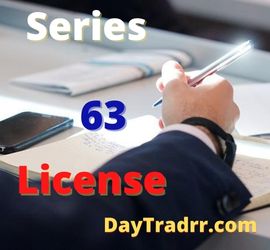Series 63 – What Is A Series 63 License?
 The Series 63 license is the Uniform Securities Agent license, which enables agents to sell securities in most of the 50 states in the U.S. To receive a Series 63 license, the applicant must pass an exam and be familiar with ethical practices and fiduciary responsibilities. Individuals who seek to offer securities in most states must pass the Series 63 or Series 66 examination, depending on their qualifications and other registration levels.
The Series 63 license is the Uniform Securities Agent license, which enables agents to sell securities in most of the 50 states in the U.S. To receive a Series 63 license, the applicant must pass an exam and be familiar with ethical practices and fiduciary responsibilities. Individuals who seek to offer securities in most states must pass the Series 63 or Series 66 examination, depending on their qualifications and other registration levels.
The Series 63 exam is called the Uniform Securities State Law Examination. It is a North American Securities Administrators Association (NASAA) exam administered by FINRA. The exam has 60 scored questions with a time limit of 75 minutes for candidates to complete the assessment. To pass the Series 63 exam, a candidate must properly answer at least 43 of the 60 scored questions.
Series 63 License – A Closer Look
The North American Securities Administrators Association (NASAA) develops and updates the Series 63 test. The association modified its questions in December 2018 in light of recent changes to the tax code. However, in January 2019, questions based on the 2018 tax code were phased out. Also, the Series 65 and Series 66 exam questions have also been updated. Previously, the Series 63 exam was known as the Uniform Securities Agent State Law Examination. The assessment is a registered exam required of all potential registered representatives in the majority of US states. However, Colorado, the District of Columbia, Florida, Louisiana, Maryland, Ohio, and Puerto Rico, do not require the Series 63.
The exam is designed to qualify applicants who aspire to work in the securities sector and sell investment products. For example, mutual funds, variable annuities, and unit investment trusts. Primarily, the exam covers the fundamentals of state securities laws. Each state has its own securities regulations, known as blue-sky laws, created to govern the sale of securities. Therefore, agents must earn the Series 63 license in addition to a Series 7 or Series 6 certification.
Series 63 License Requirements
Exam Format
The Series 63 test is administered by the Financial Industry Regulatory Authority (FINRA). The exam consists of 60 multiple-choice questions. The passing score is 72% or 43 out of 60 questions. Also, the candidate must finish the exam in the allowed 75 minutes. The exam costs $135 as of March 2020. It was created in collaboration with representatives from the securities sector by the North American Securities Administrators Association (NASAA). Candidates must be conversant with the Uniform Securities Act of 1956. Moreover, they must understand the NASAA Statement of Policy and Model Rules. Series 63 is an entry-level exam with no prerequisites after successfully submitting Form U-10.
Exam Topics
The Series 63 test covers the fundamentals of state securities regulations as well as rules preventing dishonest or unethical behavior. However, 45 percent of the queries are about rules and 10% about administrative procedures. Of the remainder, 20% covers customer communication, and 25% reviews ethical practices and business commitments. The test covers issues such as the registration of various persons and securities. Additionally, it reviews fiduciary responsibility with client funds and securities. More information can be found in NASAA’s Test Specifications. To qualify to take the Series 7 and Series 6 license tests, but not the 63, you must first pass the Securities Industry Essentials Exam (SIE). Broker-dealers must obtain the Series 63 license in addition to the Series 7 or Series 6 in order to sell securities.
The Uniform Securities Agent State Law Examination was developed by NASAA in cooperation with representatives of the securities industry and industry associations. The examination, called the Series 63 exam, is designed to qualify candidates as securities agents. Specifically, it covers the principles of state securities regulation reflected in the Uniform Securities Act (with the amendments adopted by NASAA and rules prohibiting dishonest and unethical business practices). The examination is intended to provide a basis for state securities administrators to determine an applicant’s knowledge and understanding of state law and regulations.
The Series 63 is a “criterion-based” minimum competency examination. This exam is administered to professionals within the investment industry. Criterion-based means that a minimum passing criterion is established. Those candidates who pass the exam are considered to have met the minimum competency level and those who fail do not meet the minimum competency level. The items for the exam were drafted to clearly differentiate those candidates who qualify as minimally competent from those who do not. (Source: nasaa.org)
Frequently Asked Questions
What states require the Series 63 license and how long is it good for?
The Uniform Securities Agent license is commonly known as the Series 63 license. It allows you to sell securities in most U.S. states. However, Colorado, Florida, Louisiana, Maryland, Ohio, the District of Columbia, and Puerto Rico, do not require the series 63 license. in those states, you must hold a Series 6 or a Series 7 license instead. Otherwise, you must have a series 63 license if you want to sell securities in the state where you reside, work, or plan to work. The Series 63 license is valid for the duration of your employment with a FINRA-member firm or self-regulatory body (SRO). It only expires if you are fired or quit a firm and do not find work at another FINRA-member firm or SRO within two years.
What is the difference between the Series 6, Series 7, and Series 63 licenses?
A limited representative is someone who holds a Series 6 license. Series 6 certification authorizes individuals to sell mutual funds, variable annuities, and insurance premiums in Colorado, Florida, Louisiana, Maryland, Ohio, the District of Columbia, and Puerto Rico. With a Series 7 license, individuals are known as registered representatives. They are authorized to sell corporate stocks and bonds, municipal bonds, mutual funds, variable annuities, options, direct participation program partnerships, and collateralized mortgage obligations in the same states where they hold a Series 6 license. In all other states, representatives are not permitted to sell any of these assets until they have obtained their Series 63 license, as well as their Series 6, Series 7, or both. (Source: kaplanfinancial.com)
How hard is the Series 63 exam and what kind of a job can I get with it?
You can expect the exam to be tough, because of the limited time you have to complete the questions. You have only 75 minutes. Therefore, if you spend more than a minute and 15 seconds on each question, you will quickly fall behind. However, you have a high probability of passing if you know the topic and haven’t crammed. With the Series 6 and 63 licenses, you can operate as a financial adviser or insurance agent. As a result, you can offer mutual funds and works for a brokerage, investment business, bank, or insurance company. With the Series 7 license, you can work as a stockbroker for a brokerage, investment firm, or bank. (Source: ibid)
Up Next: NFO Meaning – What Is a New Fund Offer?
 A new fund offer (NFO) is a new fund being offered by an investment company to new subscribers in order to raise funds from public investors. An NFO is the first-basis subscription offer for a new investment vehicle launched by an asset management company (AMC). The offering is launched in the market to raise capital from the public in order to buy securities like shares or bonds or other securities.
A new fund offer (NFO) is a new fund being offered by an investment company to new subscribers in order to raise funds from public investors. An NFO is the first-basis subscription offer for a new investment vehicle launched by an asset management company (AMC). The offering is launched in the market to raise capital from the public in order to buy securities like shares or bonds or other securities.
An NFO is similar to the initial public offer (IPO) of a company as an attempt to raise capital from the public market. NFOs are offered for a stipulated period. This means that the investors opting to invest in these schemes at the offer price can do so in this stipulated period only. After the designated period expires, investors can only take exposure to these funds at the prevailing net asset value. Mutual funds are one of the most common new fund offerings marketed by an investment company. The initial subscription offer price for a new fund varies by the fund’s structure.




